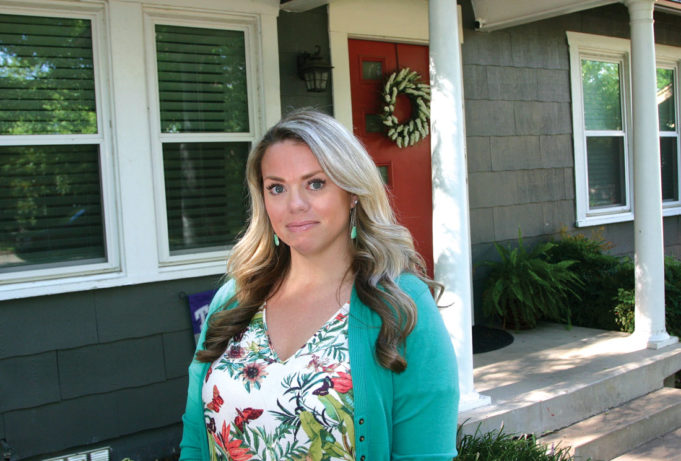Some large Texas cities have relaxed their regulations on short-term rentals in recent years to appease the growing number of Airbnb hosts seeking extra income by renting their properties for short stays.
Fort Worth isn’t among them.
Local Airbnb hosts are accusing city officials of regulating them out of business by refusing to relax rules on short-term rentals –– stays of fewer than 30 days. The hosts are banding together on social media and asking politicians to play nice.
Fort Worth is one of the state’s most populous cities and a popular tourist destination. Visitors are shelling out tens of millions of dollars a year on rentals in the area, according to Airbnb figures.
The hosts rely on their rental incomes to help pay mortgages and expenses on their properties.
“Somehow I became an activist on this topic in the last month,” said Lauren Brady, who along with her father lists a small house near I-30 and Montgomery Street as an Airbnb rental.
Brady and about 50 other Airbnb hosts are writing letters to encourage city council members to make concessions for short-term rentals.
“None of us are saying to let [hosts] do whatever,” Brady said. “It’s not nice to allow parties that are going to disrupt the neighbors, but there are ways to develop some reasonable regulations that hold short-term rental landlords accountable and still allow them to operate.”
For years, Fort Worth has outlawed short-term rentals in residential areas while allowing them in commercial areas at hotels and motels.
Brady serves as administrator of the Facebook group “FWTX Hosts,” which was created in May and currently has 65 members. One way they are pressuring city officials to become more receptive to short-term rentals at Airbnbs is to dispute the stereotype that they lend themselves to midnight beer-pong parties in quiet neighborhoods.
Local news media have reported on neighborhoods complaining about Airbnb rentals that attract boisterous people coming to town on weekends to blow off steam. Brady offers proof that those bad apples are rarities. She filed an open records request to monitor two years’ worth of police calls ending in May 2019. Out of about 66,000 police calls, only 34 involved Airbnb rentals with short-term leases, she said. Of those 34 calls, only 14 involved guests, she said.
“Most of the calls were false alarms or a dispute between the renter and the landlord about money or property being damaged or something that didn’t impact neighbors,” she said.
Still, she said, Code Compliance officers have begun issuing warnings in recent weeks to people renting their homes for short periods. Brady received one in April.
She didn’t realize the city prohibited rentals of fewer than 30 days in residential areas, she said. She had been offering short-term rentals since September 2017. Now she is focusing on long-term rentals, although they are harder to book.
“The majority of people I rent to are business executives here for business, or they are TCU parents here to visit their kids, or they are here for medical treatments,” she said. “I was shocked how many people needed clean homes with a full kitchen and a bathtub because they were here for chemotherapy or a transplant and wanted to be able to recover in a home for a couple of weeks.”
She and other hosts want the city to allow potential hosts to register their homes for short-term rentals and pay fees and taxes. The money raised could pay for another Code officer or two to monitor the properties, she said.
Dana Burgdhoff, interim assistant city manager, said the occupancy violations resulting in warnings or citations have all been complaint-driven. Recent legislative discussions, news reports, and lawsuits in other cities prompted more neighborhood discussions about short-term rentals, she said. A short-term rental has been listed in the ordinance’s definition section as 30 days for as long as Burghdoff can recall, dating back at least 20 years, she said. A year ago, however, city officials added the definition to another section of the Code rules, which alerted residents further.
“Complaints might have gone up because neighbors knew what the rules were,” she said.
Brady’s Airbnb house is in a quiet neighborhood. The neighbors on either side haven’t complained, though, and the property across the street is a vacant field. Brady and other hosts believe neighborhood associations are tracking Airbnb houses, and residents are making complaints about those houses even if they don’t live nearby.
City officials don’t investigate the complainers, only the ones being complained about, Burgdhoff said.
“Once Code gets a complaint, they do an investigation to see if it has merit,” she said. “It doesn’t really matter where it comes from.”
Fort Worth’s rules about short-term rentals are stricter than in many other large cities but not because city officials have passed new rules, Burghdoff said. Fort Worth has merely stuck with its longstanding short-term rental policy even as other cities have eased up on restrictions due to popular demand.
Residents in Fort Worth, however, have been relatively quiet, she said. “There has not been a strong demand to change the rules,” she said.
The letter-writing campaign from Brady and others might be having an impact. Burghdoff said city council members have requested a briefing in the coming weeks and will probably discuss short-term rentals in depth later this summer. They are hearing from both camps –– Airbnb hosts wanting a break and residents seeking protection. City council members will decide how to respond.
“It will be interesting to see if [councilmembers] ask us to do something different,” Burghdoff said.
If the city council does indeed ask for something different, Burghdoff is ready with a plan. Earlier this year, city officials created a conditional-use permit for commercial users. Seeking the permit is the same process as seeking a zoning change, except the permit is temporary and requires regular renewals and might be easier to achieve than a zoning change.
“If you’ve got someone doing all the right things, that might be a use that could then be permitted and renewed,” Burghdoff said.












